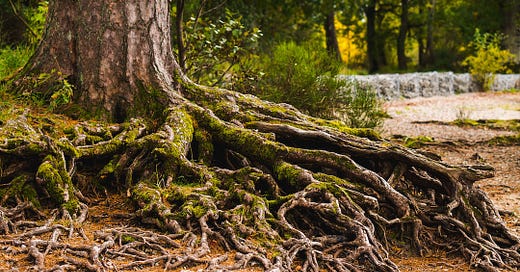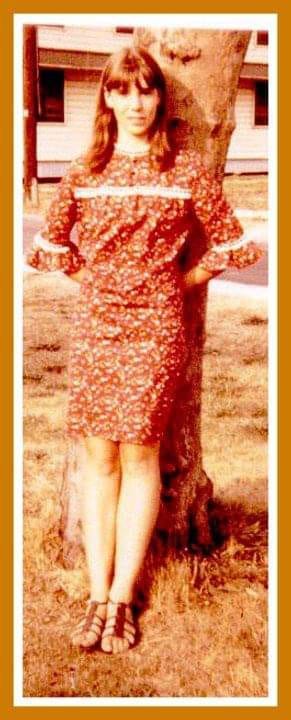Welcome to Roots & Branches. I’m glad you’re here! If you haven’t signed up, please consider a subscription to my newsletter. Our numbers continue to grow in and beyond the Adoption community — Memoir-ish Musings by Mel offers the contrast of whimsy and wabi-sabi. Whether you are new to this space, or a long-time subscriber from my early blog, I’d love to hear from you!
Stolen Roots is the name of a chapter in my memoir essay collection, Permanent Home. (With gratitude to Laura McHale Holland for the chapter titles, and Joanne Rosen for my book's digital design :)
Stolen Roots
Part 1. Severed
As an adopted child of the Baby Scoop Era whose birth records were sealed by the state of South Carolina, sibling look-alikes fascinated me. Before I knew about genetics, let alone the birds and bees, I couldn’t articulate why resemblances within families set me apart, emphasized my differentness, and isolation — all I'd lost in maternal severance. I was twenty when my daughter was born. The epiphany of realizing she was my first-known biological relative came with a profound intensity of emotion and unity. Her father, the first of six peas in a pod, shares his blue eyes and dark hair with her. In speech and song, laughter, gestures, and expressions, she and I were as alike as sisters, and I was growing up with her. But through my own weakness and identity bewilderment, the thread of unity threatened to snap and sever.
*
I knew I wasn’t theirs, really. They didn’t acknowledge my real mother, so I was slow to grasp the concept of having been birthed. I just came to be. During my childhood, the word pregnant wasn't mentioned nor explained, and little cousins came to be, but I didn’t wonder how. Not just that it was a prudish era; the 1950s, but possibly out of sensitivity to my parents' loss — not able to have children of their own.
Was my sense of separation, isolation, and disconnection imagined? I couldn’t compensate for the missing biological link. My adoptive dad, an Air Force officer, told me early on that Catholic Charities tried to place babies with parents of similar origin. So, I found my way from abandonment to the home of a second-generation Irishman. I wasn’t fooled into thinking I resembled him. His face was wide and round next to mine which was long and oval. I tanned easily as a child, and his fair complexion burned awfully. We didn’t share our smiles, gestures, and mannerisms. I looked even less like my mom, who was of Eastern European ancestry. “I don’t know who you are. I don’t know how to talk with you,” she said. I was five feet seven at age thirteen to her five feet two. She was busty and I was flat-chested. In highlighting our differences and imperfections, she disclosed her disappointment. “Why can’t you do things the way I do? You’re completely different from me.” Incomplete, inferior, and always out of place — newborn abandonment had caused me harm that adoption couldn't solve, and military life compounded it. Family separation, piety, and a culture of duty, discipline, and secrecy had profound effects on the neurotic, highly-sensitive girl.
In high school, my moods swung in the wild pendulum of identity bewilderment, televised losses, a steady musical soundtrack of flower power, poetry, and Leary-influenced escapism. My dad spent a year in Northern Thailand while I was tuning in, turning on, and dropping out of the Catholic all-girls academy, entering the co-ed high, and all the while despairing I’d never meet my first family, and that the truth of me was unknowable.
***
End of Part 1. Next week: Part 2. Unmatched







Bravo ! ! ! 🦎🏴☠️🍁